- Share on WeChat
- Scan QRCode using WeChat,and then click the icon at the top-right corner of your screen.
- Share on WeChat
-
- Scan QRCode using WeChat,and then click the icon at the top-right corner of your screen.
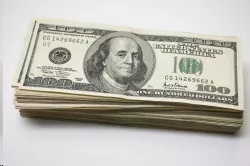
Hello, I hope all is great with you! We recently helped launch the Data Dividend Project to get people paid for their data. Well there’s a way to get money right now if you used Yahoo’s email services. You may have heard that there were multiple data breaches of Yahoo accounts between 2012 and 2016. Someone sued and got a settlement on behalf of consumers — a $117.5 million settlement fund for everyone who used Yahoo email. That means if you had an email account with Yahoo between 2012 and 2016, whether a paid account or a free account, they could owe you up to $358 or two years of free credit monitoring. For real. The money’s in a bank account waiting for Yahoo users to claim. We have top lawyers who looked at it and it’s all legit and good to go. So, what do you need to know about applying? Eligible users can submit claims here — the Data Dividend Project has a short 3-question survey and then will direct you to the right place to make your claim. All claims must be postmarked or filed online by July 20, 2020. Tell your friends too — they’ll owe you one. I’m like you — I can’t keep track of this stuff either. That’s why I love the Data Dividend Project because now we have someone who is looking out for us, who will tell us about these kinds of lawsuit settlements and stand up for our rights with the big tech companies. In this case, I got excited because it’s free money for users to make up for a tech company’s screw up. I love getting people money they have coming to them. This Yahoo breach settlement won’t be the last. I hope that you will find this information useful and act on it. We must hold tech companies accountable for their actions. Every day we generate data for them to use or abuse simply by going about the business of our daily lives. Let’s not just compensate Americans for this data breach, but actually get people paid for their data on a regular basis. Please consider partnering with me and join the Data Dividend Project. Your data should belong to you! And we will not rest until you get paid for it. Sincerely, - Andrew
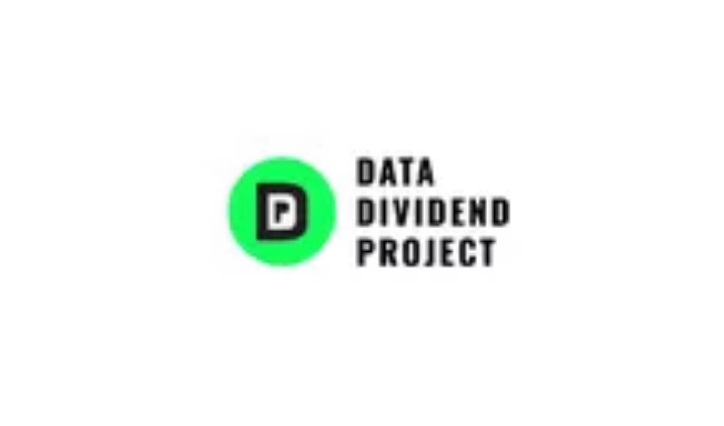
During my campaign, I argued that our data should be ours. That sounds obvious, but today, big tech companies and data brokers are selling and re-selling our data every day, and we are none the wiser. This is a very big deal. Facebook today is a $650 billion company built largely upon the monetization of our data. How much of that value are we seeing? We have increasingly become commodified and packaged for those who want to occupy our attention. They are not just profiting from these practices. They are also influencing our actions and attitudes by feeding us information that maximizes our engagement above all else. We are being pushed in specific directions to the detriment of our democracy, mental health, and free will. Instead of having things sold to us, we ourselves have become the product, and we are being sold to those with the means to buy access to every detail about our behavior — and to shape what we do next. The question is, what do we do about it? I am thrilled to say that there is a new law on the books that will enable us to fight for our data property rights. California’s Consumer Privacy Act — the CCPA — became effective on January 1. It stipulates that every Californian has the right to know what personal information is being collected, the right to access that data, the right to know who it’s being sold to, and the right to opt out of those sales. Tech companies are currently lobbying California regulators to water down how these rights will be enforced — but they will be enforced starting on July 1. Nevada has already passed a similar law, and multiple other states are looking to do the same. To drive this effort, Humanity Forward has partnered with a new organization — the Data Dividend Project — to help fight for YOUR data rights. We know that the average citizen is completely outgunned and in the dark about how to take back control of your data. The tech companies have billions of dollars and hundreds of lawyers. What does the average citizen have? The Data Dividend Project aims to gather together hundreds of thousands of Americans to collectively bargain to take back your data rights that are currently being exploited by the big technology companies and data brokers. They won’t listen to anything but a unified voice. It’s called the Data Dividend Project because the goal is to change the status quo so that, if you choose to share your data, YOU can get paid for the use of your data. After all, if anyone is making money off of your data, shouldn’t it be you? This is another way we can get money into people’s hands now instead of waiting for Congress to get its act together. If this sounds good to you, go to ddpforall.com to help power this consumer revolution. And tell your friends to do the same. It’s very quick and easy. And after they get their dividend too, they’ll thank you and owe you dinner. I hope you’re as excited about the Data Dividend Project as I am. Let’s fight for humanity and give us control back of our own future, our own data, and our own property. It’s ours already — we just need to take it back. - Andrew Source:https://movehumanityforward.com/
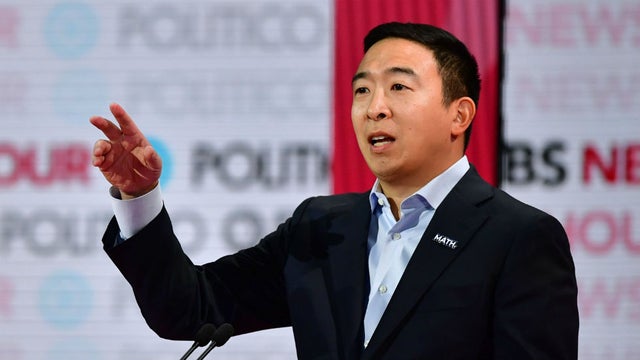
BY JUSTINE COLEMAN | THE HILL © Getty Images Democratic presidential candidates entrepreneur Andrew Yang, Sen. Amy Klobuchar (D-Minn.) and billionaire Tom Steyer all saw an increase in favorability following the December debate, a poll released Monday said. This week’s Morning Consult poll found that Yang saw a 7 percentage point increase in favorability to 34 percent after the debate. Klobuchar and Steyer both rose 5 percentage points in favorability to 25 percent and 20 percent, respectively. Yang and Klobuchar both saw fundraising boosts following the debate, with Yang reportedly raising $750,000 and Klobuchar claiming to collect more than $1 million by Friday night. The debate held last week featured a smaller number of candidates, allowing some of the lesser-known candidates to shine on stage. Former Vice President Joe Biden maintained his lead at 31 percent support following the debate, with runner-up Sen. Bernie Sanders (I-Vt.) reaching 21 percent support. The poll surveyed 7,178 people between Dec. 20 and Dec. 22. The poll had a margin of error of 1 percentage point.
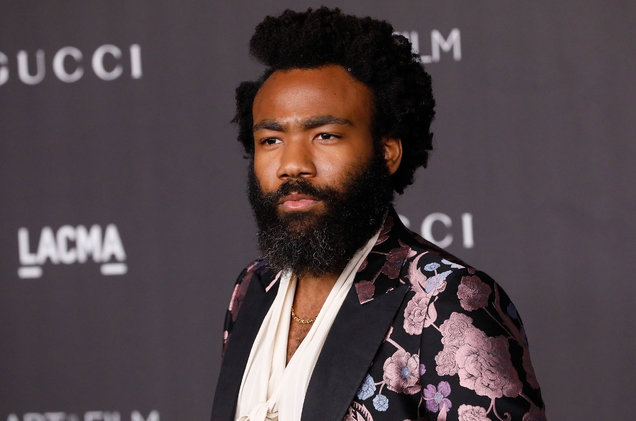
By Rania Aniftos | Billboard Taylor Hill/Getty Images. Donald Glover attends the 2019 LACMA Art + Film Gala at LACMA on Nov. 2, 2019 in Los Angeles. Donald Glover, known musically as Childish Gambino, has officially taken his pick for the 2020 presidential election. The multihyphenate star made a vague endorsement of Democratic candidate Andrew Yang via Instagram story, hinting at a pop-up event in Los Angeles on Thursday (Dec. 19). The event will take place at 507 N Fairfax Ave at noon, though the post doesn't have much information at all regarding what the pop-up would entail. If Glover were to perform, it would be his first since his Austin City Limits set in October. Attention L.A. #YangGang! pic.twitter.com/HH03XRvIWI — Andrew Yang🧢 (@AndrewYang) December 18, 2019 The "This Is America" crooner isn't the only musical member of the Yang Gang. Though he has not officially endorsed Yang, Weezer's Rivers Cuomo made campaign contributions to the candidate last month, and the band played at his Des Moines rally. Yang will take the stage for another Democratic debate on Thursday night (Dec. 19).
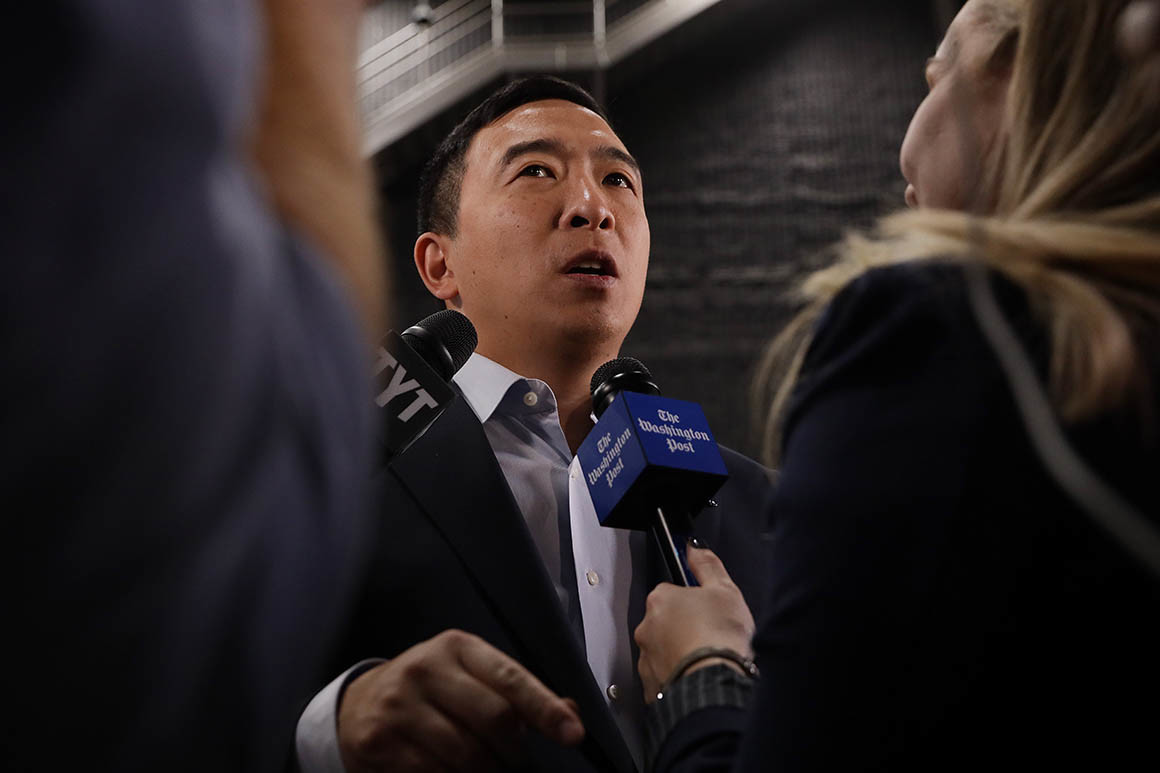
He's the seventh — and likely final — candidate to qualify. By ZACH MONTELLARO | POLITICO Andrew Yang needed to hit 4 percent in one more poll. | Alex Wong/Getty Images Andrew Yang has qualified for the December Democratic primary debate just days before this week's deadline, joining six other candidates on the stage. Yang received 4 percent support in a national Quinnipiac University poll released on Tuesday, one of the two qualifying polls to be released after a nearly two-week drought. Yang had come tantalizingly close to qualifying before — hitting 3 percent in 12 of the 26 December qualifying polls released so far, including a Monmouth University national poll released earlier in the day. He’ll join six other candidates who have already qualified for the Dec. 19 debate in Los Angeles, which is co-hosted by PBS NewsHour and POLITICO: Joe Biden, Pete Buttigieg, Amy Klobuchar, Bernie Sanders, Tom Steyer and Elizabeth Warren. To qualify, candidates need to hit 4 percent in four polls approved by the DNC (or 6 percent in two early-state polls) and have contributions from 200,000 unique donors. No candidate’s qualification is official until confirmed by the DNC; candidates' qualification is based off of POLITICO’s tracking of public polling and donor counts. "We are going to do something unprecedented on the debate stage next week, and that is show up as the lone person of color," Yang joked to reporters in Iowa. "I'm excited to make the debate stage, not surprised. We've been showing consistent growth throughout." "I will be honest, I thought we would going to make it based upon a poll in one of the early states," he continued. "But thrilled to make it on the basis of a national poll — that in some ways is even better." Both polls show Biden, the former vice president, leading the field. In the Monmouth poll, Biden has a narrow lead over the two leading liberal challengers, Sanders and Warren. He is at 26 percent to Sanders' 21 percent and Warren's 17 percent. Pete Buttigieg is a distant fourth at 8 percent, followed by Mike Bloomberg's 5 percent. Sen. Amy Klobuchar was at 4 percent, her best performance in a Monmouth national poll this year, which made her the final candidate to clear that benchmark. The Quinnipiac poll shows Biden with a greater advantage. He is at 29 percent, to Sanders’ 17 percent and Warren’s 15 percent. Buttigieg is at 9 percent, and Bloomberg is at 5 percent. Yang is the last candidate at the 4 percent mark. Biden, Sanders and Buttigieg were roughly stable in the Monmouth poll, compared to the results of a November poll from the university. Warren saw a modest drop, and this is the first time Bloomberg was included in a Monmouth poll since the beginning of 2019, before he initially ruled out a presidential run. In the Quinnipiac poll, Biden and Sanders both saw a small modest bump. Warren was stable, while Buttigieg's vote share dropped 7 points. Tulsi Gabbard, the only other candidate who is close to qualifying for the debate, had less than 1 percent support in the Monmouth poll and 2 percent in the Quinnipiac poll. Gabbard is one poll away from qualifying. However, she seemingly removed herself from contention Monday evening. "For a number of reasons, I have decided not to attend the December 19th 'debate' — regardless of whether or not there are qualifying polls," she tweeted on Monday. "I instead choose to spend that precious time directly meeting with and hearing from the people of New Hampshire and South Carolina." However, the Hawaii congresswoman could always change her mind. She publicly toyed with boycotting the October debate, before ultimately opting to participate. Bloomberg will not be in the Dec. 19 debate, either. He is not collecting campaign contributions, which precludes him from the debate stage — and it isn't clear if he would hit the polling threshold either. No other debate qualifying polls have been publicly announced ahead of the Thursday deadline, but polls' releases are not typically announced well in advance. All of the polls approved by the DNC are conducted either by independent media outlets or universities, who decide on their own when to conduct and release polls. Some pollsters have publicly bemoaned the position the DNC has put them in, arguing that debate qualifications was not the reason they were conducting surveys. Yang found out he qualified for the debate during a meeting with the Des Moines Register's editorial board, when his campaign manager held up a sign that said "4%! We're in!" The Monmouth University Poll was conducted from Dec 4-8. It surveyed 384 registered voters who identify as Democrats or lean toward the Democratic Party and has a margin of error of plus or minus 5 percentage points. The Quinnipiac University Poll was conducted from Dec. 4-9, surveying 665 registered Democratic voters and independent voters who lean Democratic, and has a margin of error of plus or minus 3.8 percentage points.
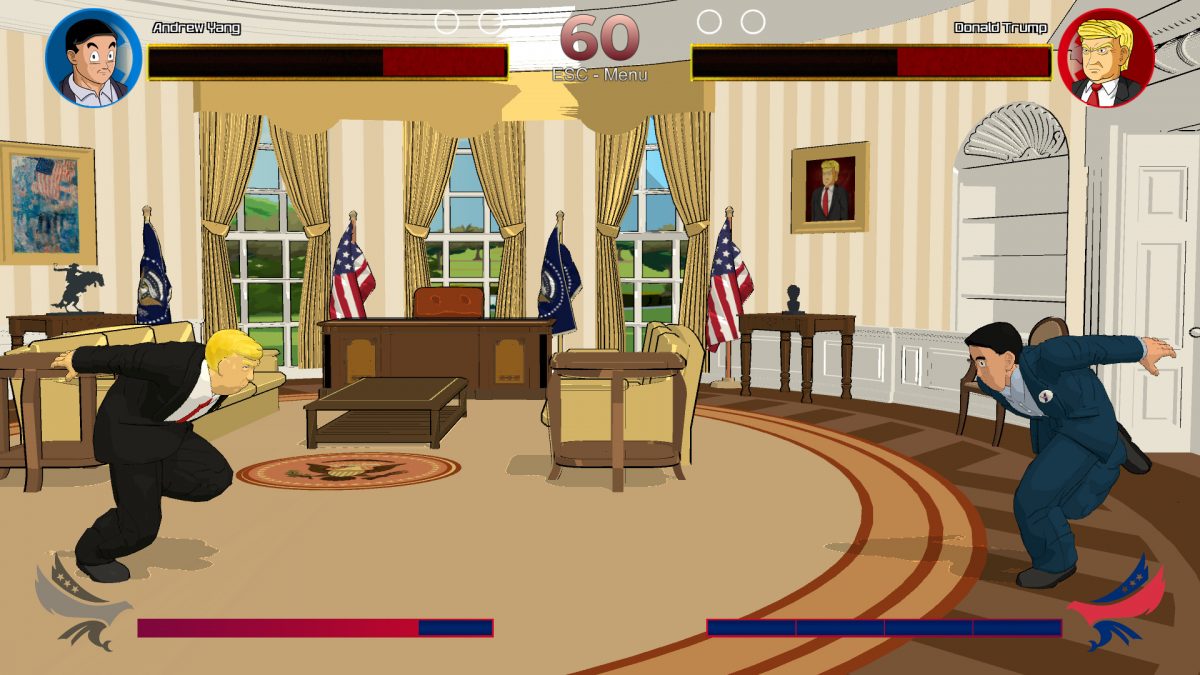
Kevin Webb, Business Insider US Donald Trump and Andrew Yang face off in “Yang2020 Path to Presidency.” “Yang2020 Path to Presidency” “Yang2020 Path to Presidency” is an upcoming computer game featuring Andrew Yang, President Donald Trump, and several other candidates in the 2020 presidential election. Yang is the star of the game’s story mode, but he’s not the only playable character. You’ll be able to unlock the other presidential candidates and go head-to-head in versus mode. “Yang2020 Path to Presidency” will be available for PC on December 30, but the price hasn’t been set yet. The Democratic presidential candidate Andrew Yang is the star of an upcoming video game featuring the front-runners of the 2020 election – “Yang2020 Path to Presidency.” The game will let the 2020 candidates fight for the presidency, with a fictional story mode charting Yang’s path to office. Though fighting games are inherently violent, the recreations of the candidates in “Yang2020 Path to Presidency” are obvious parodies performing cartoonish attacks. Players will be able to unlock President Donald Trump, Sen. Bernie Sanders, Sen. Elizabeth Warren, Sen. Cory Booker, and other characters, each with their own ridiculous set of special attacks. While the game revolves around Yang’s campaign, it was made by an independent developer, Sam Vallely. Early footage of “Yang2020” surfaced in September, and the full game is scheduled for release on December 30 via Steam, the largest PC gaming marketplace. The gameplay footage shown in September was from an early version of the game, so the finished product could be much different. Yang has not formally endorsed “Yang2020 Path to Presidency,” but the Democratic candidate has shown appreciation for similar games in the past. In a pair of tweets earlier this year, Yang said he spent much of his adolescence playing “Street Fighter 2,” the seminal fighting game that has defined the genre for decades. I literally spent my teenage years playing Street Fighter II in New Hampshire. pic.twitter.com/ynTYg56Djx — Andrew Yang🧢 (@AndrewYang) September 28, 2019 “Yang2020 Path to Presidency” also draws inspiration from the popular anime series “Dragon Ball Z.” Yang loosely resembles the character Gohan, and the candidates are capable of firing energy beams that are a staple in the “Dragon Ball” series. “Yang2020” will be available on December 30, but the price has not been set. The next Democratic presidential debate is scheduled for December 19, but Yang’s polling numbers are too low to qualify for the stage as of December 9.
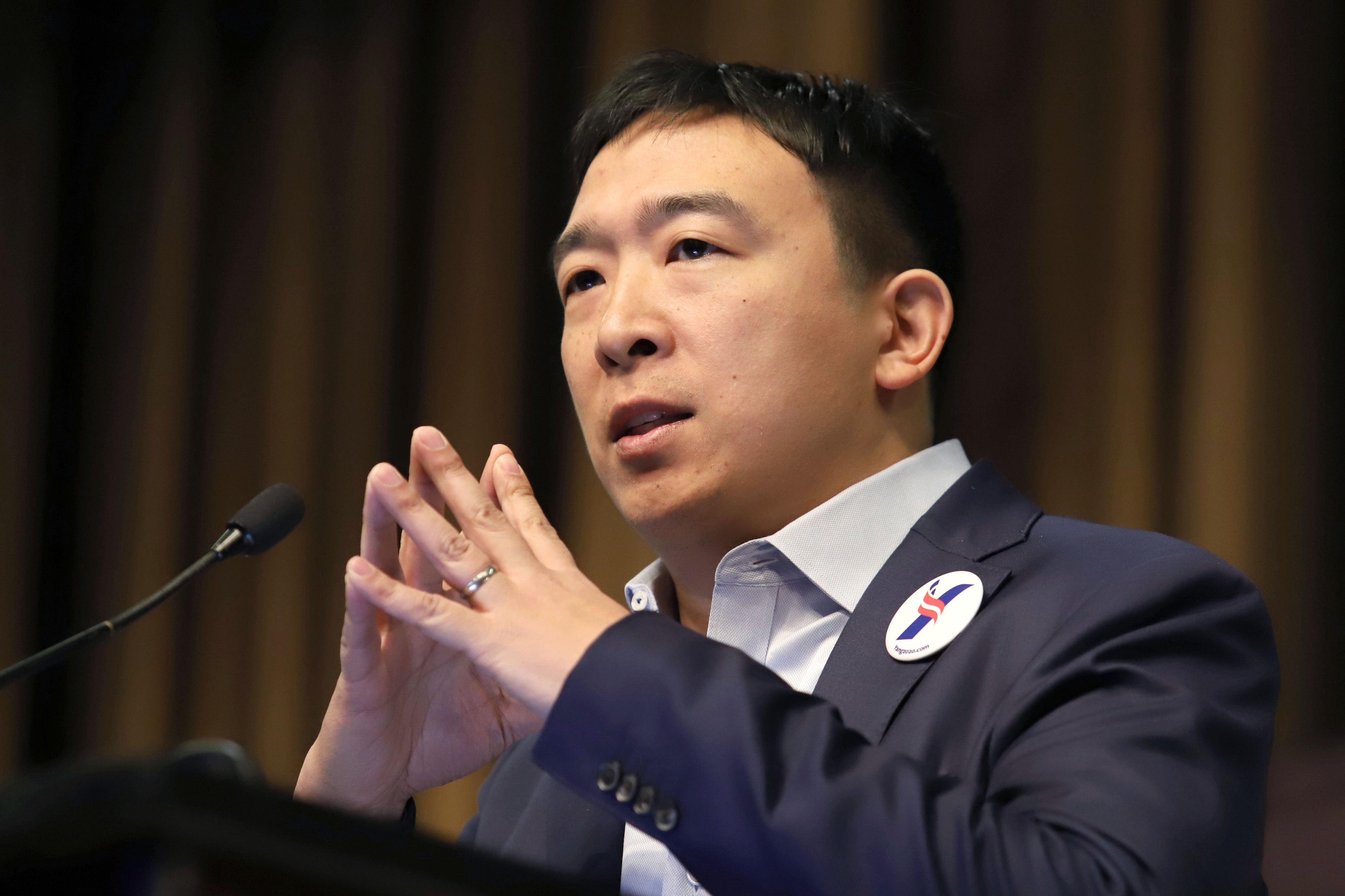
By Carbon Radio | Medium Image Source: Shutterstock First of all, Andrew Yang is going to be in the Labor International Hall of Fame and in the U.S. Department of Labor’s Hall of Honor. There is no doubt that his work has qualified him to be remembered as one of the most impactful labor advocates of the 21st century. There might even be a Nobel Peace Prize in his future for his extraordinary efforts to prioritize human value over economic value. He has been asked many times now in interviews on the campaign trail, “If you do not win the nomination, would you serve in the Administration of the candidate that does win?” He has consistently responded that as a parent and a patriot, he believes it is his responsibility to do whatever he can do to move the country forward. Many people have suggested that he would make an exceptional Secretary of Labor. And, those people are right. Andrew Yang would be an exceptional Secretary of Labor. But having Andrew Yang as a Secretary of Labor would be a little bit like having Michael Jordan as the seventh man on a basketball team. The seventh man on a basketball team is not a starter and is generally not very well known. The seventh man is a good basketball player, and is absolutely necessary for championship teams, but you would never consider making Michael Jordan or Stephen Curry or Kobe Bryant a seventh man. What makes Andrew Yang the best candidate to be President? In politics and leadership, there are no points to count to show how much better a candidate is than another. In sports, we can say a player is better because they are faster, stronger, smarter, and they score more points. In politics and leadership, all of the candidates are smart, quick-witted, and confident, and they all have noteworthy experience. And, there is no way we can say that one type of experience will inherently be better for the country. So how can anyone possibly assert that one candidate will be better for the country? The best hockey player to ever play the game, Wayne Gretzky, was famously taught to skate to where the puck is going, not where the puck has been. Perhaps the most constructive way to determine who would be the best President is to evaluate each candidate’s ability to see where the puck is going. In other words, the most valuable superpower in a Presidential candidate is the ability to see the future(s). If you had ten candidates with ten different superpowers, you would be wise to always choose the candidate that can see the future(s), because that is the candidate that would be most likely to make good decisions for the country. The skill of foresight is far more important than any other skill. What does Andrew Yang see that other candidates don’t? He is the only candidate to openly recognize the disruptive impact of automation and AI on our economy. His website notes, “Technology is quickly displacing a large number of workers, and the pace will only increase as automation and other forms of artificial intelligence become more advanced. ⅓ of American workers will lose their jobs to automation by 2030 according to McKinsey. This has the potential to destabilize our economy and society if unaddressed.” And, he has been talking about this on the campaign trail for months, and none of the other candidates have started talking about these trends. Do the other candidates not see this? It is possible that the other candidates are so singularly focused on ousting the current administration that they aren’t able to see past the 2020 election. What does that say about how they would operate in the White House? We face a convergence of crises the likes of which humanity has never encountered. Imagine for a moment automation and AI trends continue and millions lose their jobs in a matter of just a few years. The poverty rate skyrockets as millions of baby boomers attempt to retire. Then a series of hurricanes hit major cities like Houston, New Orleans, Miami, and New York City, and thousands more are displaced from their homes. And then right as we are recovering from those disasters and Congress is passing a major stimulus package, a new conflict starts in the Middle East, and the international community looks to America to step in. And then it is campaign season again and the President has to manage all of the current crises while defending the actions of the last four years. If the President we elect has the gift of foresight, we as a country will be much better off, especially in the long run. There is no doubt that the career politicians in the race are good leaders, and they have represented their constituents well. But, there is clearly only one candidate with the gift of foresight and the courage to call attention to what he sees. Andrew Yang.
Democratic White House hopeful Andrew Yang released eight years of his tax returns Wednesday ahead of the Thanksgiving holiday. Yang released the returns for 2011 to 2018, the period after he created Venture for America, which offers two-year fellowships to help recent college graduates work at startups. The returns don’t include the period when he worked at a series of startups. Yang filed the tax returns jointly with his wife, Evelyn, whom he married in 2011. The Yang campaign told The Hill that it decided to release Yang’s tax returns starting in 2011 because the founding of Venture for America was “a good milestone in his timeline.” Yang’s 2018 federal tax return reported adjusted gross income of $121,418 and total taxes of $16,581, for an effective tax rate of 13.7 percent. Much of his income came from his writing and speaking, capital gains, and income from rental real estate and royalties. Yang claimed the standard deduction at the federal level for 2018 but itemized his deductions on his New York state tax return. The state tax return reported charitable contributions of $4,186. 2018 was the first year people filed their taxes under President Trump's tax cut law. Tony Nitti, a partner at the accounting firm RubinBrown, said that Yang appears to have paid less in taxes for 2018 than he would have under the old tax law. Yang benefited from provisions in Trump's tax law such as the lower rates, larger standard deduction and deduction for income from noncorporate businesses, Nitti said. In most years during the 2011 to 2018 period, Yang reported adjusted gross income of between $100,000 and $300,000. He didn’t report any income from wages and salaries for 2018, but a sizable amount of his income came from wages and salaries in the prior years, before he stepped down from Venture for America in 2017. The year when he reported the highest adjusted gross income was 2016, when he reported adjusted gross income of $354,484. The amount of Yang’s charitable contributions varied considerably from year to year. For 2011, he reported charitable contributions of $126,404, and for 2013, he reported charitable contributions of $62,362. But in several other years, he reported contributions of less than $5,000. The Wall Street Journal reported earlier this year that Yang gave Venture for America $121,000 in 2011. Yang's 2012 tax return reported $5,000 in donations of clothing and shoes to the nonprofit Housing Works. The document reported that Yang and his wife purchased the clothing and shoes for $50,000 and donated them at a value of 10 percent of the cost. “Andrew Yang’s tax returns show what America has come to know about him. He’s an entrepreneur at heart while trying to balance the financial interests of his family,” Yang campaign national press secretary S.Y. Lee told The Hill. “Since leaving his job at Venture for America to run for president almost two years ago, he has devoted his time and energy to travel across our country to talk with voters and build a grassroots movement that has him now among one of the front-runners for the Democratic nomination,” Lee added. After graduating from Columbia Law School in 2000, Yang worked on a series of startups for more than five years. He then went on to work at test preparation company Manhattan Prep, which he ultimately led and helped sell to Kaplan. He later founded Venture for America in 2011 and announced his White House bid in 2017. Many of the other Democratic presidential candidates have already released their tax returns — particularly the top-polling candidates. Aside from Rep. Tulsi Gabbard (D-Hawaii), Yang is the last of the candidates who appeared at last week’s debate to make his or her tax returns public. Sen. Elizabeth Warren (D-Mass.), another White House contender, has released 10 years of her tax returns, but the documents, which cover 2008 to 2018, do not include a significant portion of time during which she was doing legal consulting. A notable candidate who has yet to release his tax returns is former New York City Mayor Michael Bloomberg, a billionaire who entered the race only days ago. Bloomberg’s campaign has said that he will release his tax returns. President Trump in 2016 became the first presidential nominee of a major party in decades to not release his own tax returns. He has claimed that he hasn’t released the files because he is under audit, but the IRS has said audits do not prevent individuals from publicizing their own tax information. House Democrats are now waging a court battle with the administration to obtain the president’s tax returns, arguing they need to see the documents to evaluate the IRS’s policy of conducting mandatory audits of presidents. source: BY NAOMI JAGODA AND TAL AXELROD - https://thehill.com
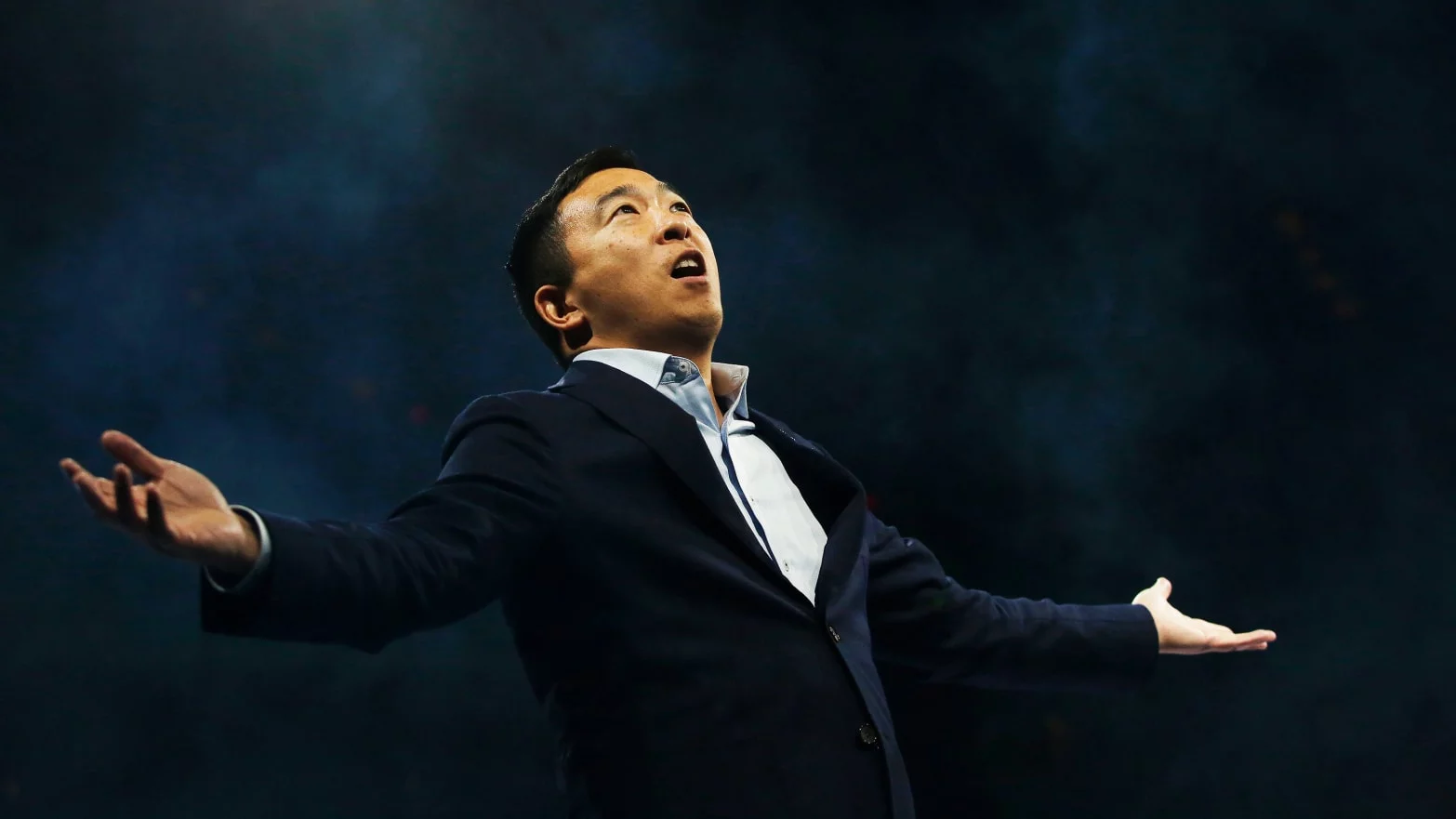
The Daily Beast joins the 2020 Democrat backstage at “Jimmy Kimmel Live” where he continues to wage his war against MSNBC. Matt Wilstein | Daily Beast Joshua Lott HOLLYWOOD, California—Andrew Yang and his entourage roll up to the El Capitan Theatre about 30 minutes before showtime at Jimmy Kimmel Live! Tuesday night. Outside on Hollywood Boulevard, enthusiastic members of the #YangGang wear “MATH” hats (for “Make America Think Harder”) and hold up signs that read “What would you do with your Freedom Dividend???” referring to Yang’s signature Universal Basic Income policy initiative that would put $1,000 per month in the pocket of every American. It’s the late-night show’s last episode before the Thanksgiving break and the Democratic presidential candidate is set to appear as Jimmy Kimmel’s second guest, following actor Laura Dern. “Between Jurassic Park and the 2020 primary, they’re both working to defeat dinosaurs,” the host joked in his monologue. Kimmel seemed a bit dubious of Yang from the moment he sat down. The host cracked jokes about robots coming to take our jobs and wondered why a non-politician believes he can become the 46th president of the United States. “Why go right for president? Why not start with senator or representative?” Kimmel asked. Yang argued that automation is happening too fast for him to wait. “Robot trucks may be on our highways in five to 10 years, and I thought biding my time trying to climb the ranks—we just didn’t have that kind of time.” “I think you have some very interesting ideas,” Kimmel said at the end of their eight-minute sit-down. “I don’t think you’re going to be president, but who knows? Maybe you will! I didn’t think Trump was going to be president either.” It wasn’t exactly how Yang wanted the interview to end, but at least it was over. “I feel great now,” Yang tells me in his dressing room, sounding relieved after the taping before he has to hop in a cab to LAX. “I have done my lift of the day, a national late-night TV interview.” Yang seems tired and a bit distracted during our conversation as he watches musical guest Bishop Briggs play quietly on the screen. He perks up when he sees a supporter wearing a “Yang 2020” T-shirt in the crowd. “I actually know this band,” he marvels later. Asked if he thinks Kimmel was a bit dismissive in his final comments, Yang tells me, “I didn’t think much of it. Right now, statistically, he’s correct. Though I think he is underestimating our chances.” The candidate cites betting markets like Predict It, which currently place him at an 8 percent chance of becoming the Democratic nominee, right behind new entrant Michael Bloomberg at 11. “That strikes me as the most accurate predictor you could find,” he says. “And if you think about sporting outcomes, how often do 5-to-10 percent outcomes happen in sports? All the time. So Jimmy can be right that I’m unlikely to be president. But it can also be right that I have a far higher chance than almost anyone else and far unlikelier things have happened.” And yet Yang clearly doesn’t feel as though he’s being treated as, if not a top tier candidate, than at least a major contender. At last week’s fifth Democratic primary debate, hosted by MSNBC in Atlanta, Yang only spoke for a total of six minutes and 48 seconds, about half the speaking time of frontrunners Elizabeth Warren, Pete Buttigieg, Joe Biden and Bernie Sanders. After Yang appeared on CNN to accuse MSNBC of “suppressing” his campaign by asking him fewer direct questions than some candidates who are polling below him nationally, his social media army (the #YangGang) got #BoycottMSNBC trending on Twitter. “I’m not the kind of guy who takes offense easily but at this point you have to call it like you see it,” he told CNN’s Ana Cabrera. Source: UBIC.PowerVoter.US When I ask Yang why he didn’t bring his war on MSNBC to Kimmel’s audience, he says, “I was happy to talk about it if it came up, but it didn’t come up and I could see why he wouldn’t want to bring it up.” “We laid out very clear and reasonable requests,” he says of his team’s ongoing communications with MSNBC. He sums them up like this: “Own the fact that you’ve made mistakes in our coverage, treat us like any other campaign and allow our surrogates on air like you do other campaigns.” “To me, it would be the easiest thing in the world for them just to say ‘sure,’” he says. “As a matter of fact, I think eventually they will say ‘sure’ because now they’re left trying to explain why hundreds of thousands of supporters of my campaign are feeling ill-served by their news coverage.” Yang has said that he would not go on MSNBC again until they issue an on-air apology to his campaign. Now, he says he suspects “at some point” the network will “be professionals” and admit their mistakes. “Then I’ll be on their air talking to voters the next day,” he says. “If you were generous, you could just say that they didn’t understand my campaign at first,” Yang says. The thing he finds most “off-putting” is that other news organizations that didn’t take him that “seriously” at first eventually “figured out that I’d beaten half a dozen sitting senators and governors and congresspeople and then they started treating me like other candidates.” “But for whatever reason, MSNBC never made that transition,” he adds, letting out a frustrated laugh. “They’ve treated me like I was a non-factor even after I was objectively fifth or sixth.” At one point I ask Yang if he thinks MSNBC is the most useful target for a Democratic primary candidate given that Fox News, well, exists. “I’m not on Fox all the time so I don’t have the basis for comparison,” he says carefully before pivoting back to his preferred target. “All I’m saying is that I’ve been on MSNBC a number of times and they’ve still omitted me from over a dozen graphics, called me the wrong name on air, asked me fewer questions in two debates. So at some point you have to say this is not objective news coverage.” Still, it’s striking to hear a Democrat be so critical of MSNBC when he has appeared numerous times on Fox News—not exactly a paragon of “objective news coverage.” Asked if he would continue to go on Fox despite his MSNBC boycott, Yang says, “I’ve been on Fox I think a dozen times and I would go back, for sure. I would take any opportunity to talk to Americans.” Yang’s lack of speaking time at this month’s debate seems to have been the final straw in his relationship with MSNBC. But critics might argue that he spoke less than anyone else because he did not jump into the fray as aggressively and because other candidates did not attack him directly, in turn giving him opportunity for a rebuttal. With December’s Los Angeles debate, co-hosted by PBS and Politico, around the corner, I wondered how he might approach things differently. “The fact is, my displeasure really just applies to MSNBC,” Yang says. “The debate before, on CNN, I thought was a very fair debate. I got some fair questions. So I’m not concerned at all about this upcoming debate, because it’s a different team.” As Yang’s campaign manager chimes in to remind him that it’s about “the people,” the candidate slips into talking points, adding, “But it’s less about me and more about the hundreds of thousands of Americans who contributed to my campaign who expect me to be treated like other candidates. Or the millions of Americans who know we need to rewrite the rules of the 21st century economy to work for us.” And, he says, that also applies to “the people who tune into MSNBC and expect to see objective coverage instead of seeing one candidate mysteriously disappear from their graphics.”
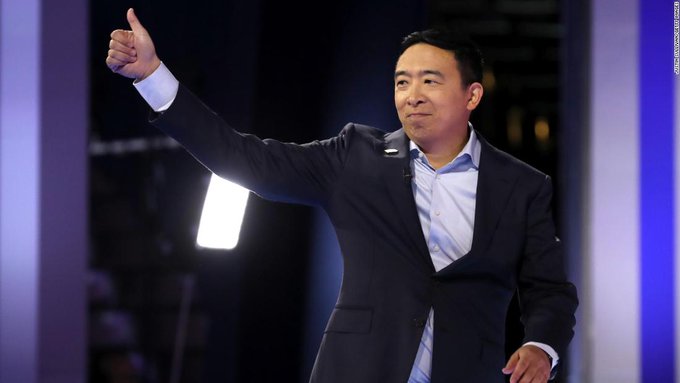
Analysis by Chris Cillizza, CNN Editor-at-large (CNN) - Andrew Yang, sometime in the next two weeks, is expected to qualify for the sixth Democratic debate next month in Los Angeles. That will represent a clean sweep for Yang, as he will have made the stage in all six of the Democratic presidential debates this year. That in and of itself would have been quasi-unthinkable in the early months of 2019, when Yang was a total political unknown, given somewhere between none and a snowball's chance in hell of even being relevant in the 2020 primary fight. What's been clear for months now, however, is that Yang -- through his quirky personality and willingness to talk about previously taboo topics like automation and universal basic income -- has built a durable following online and offline that outpaces many of the better-known candidates who have left the race and several who are still in it. On that, everyone -- mostly -- agrees. But in the wake of Yang's surprisingly strong debate performance last week in Atlanta, it's worth asking a different question: Are we still underrating Yang, his influence on the race and his chances going forward? The answer to that question, I think, is yes. Look at all of the traditional measures of success of a candidacy: * Money: Yang raised $10 million in the third fundraising quarter, more than, among others, Sen. Kamala Harris of California and former candidate Beto O'Rourke. And his money momentum is all in the good direction. * Polling: Yang started at roughly 0% everywhere. He's now up to 3% nationally and in Iowa, according to Real Clear Politics, and at 2% in New Hampshire. Which isn't amazing! But again, trajectory matters. Yang has continued to slowly but surely gain support even while many of his opponents have lost it. And he already has three polls (out of the four he needs) showing him at 4% or better in either early state or national polling to make the December debate. * Grassroots energy: Yang has already gone over 200,000 individual donors. His online following is rabid and organized. * Policy: There was a discussion of UBI -- Yang has proposed that every person 18 or older get $1,000 from the government each month -- in the October debate, which was a) stunning and b) a major win for Yang and his allies. Yang's focus on the effects of automation and the need to begin considering our data as our most valuable resource are also helping to drive conversation in the race. Yang checks all those boxes -- at least as much as some of his rivals in elected office who have received far more attention. And now, after months and months of downplaying what his supporters believed was media blindness to his candidacy, Yang is speaking out. "MSNBC is trying to suppress and minimize my campaign because there are certain other candidates that they might favor," Yang told Politico on Monday, citing his lack of speaking time (in comparison with other candidates with similar poll numbers) in last week's debate. (Yang provided no other evidence to back up his bias claims.) The Point: Yang's candidacy is deeply unconventional. And therefore harder to cover or quantify. But as the current resident of the White House can attest, unorthodox candidacies can resonate in ways more traditional ones simply cannot. source: https://edition.cnn.com/2019/11/25/politics/andrew-yang-2020-support-underrated
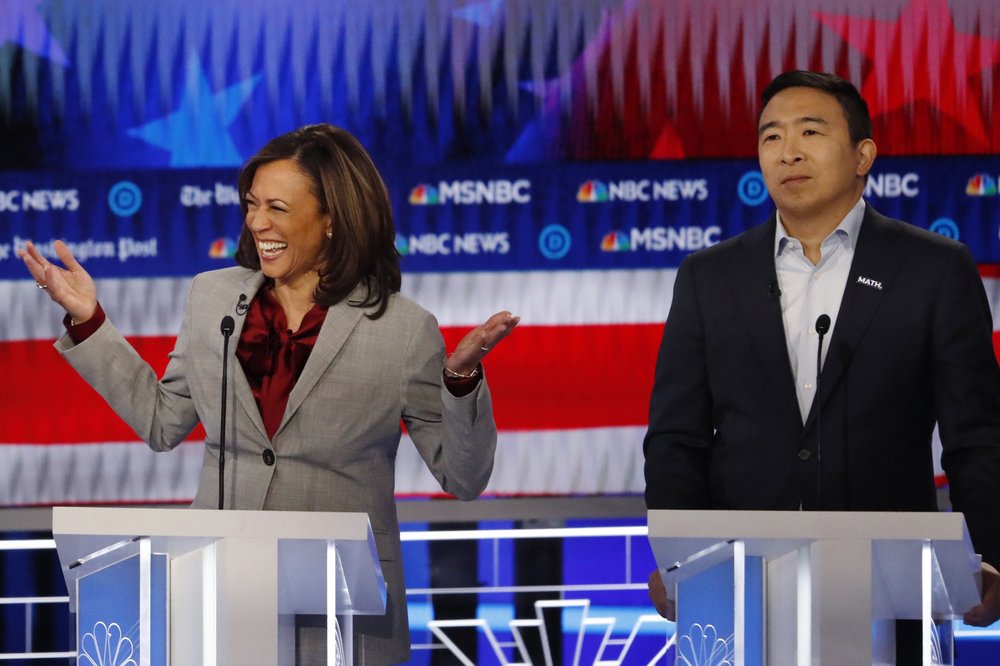
ATLANTA — William Tecumseh Sherman burned this city to the ground 155 years ago this month, but the candidates gathered here Wednesday night showed little interest in torching one another. Though no one tried singing “Kumbaya” during the fifth debate of the Democratic primary, by unspoken agreement or political chance a sort of détente broke out on stage as the field mostly directed their collective fire toward the current occupant of the Oval Office. Of course, it wasn’t expected to be this way, especially not for Pete Buttigieg. The conventional wisdom was that the mayor of South Bend, Ind., would have a newly drawn target on his back. He now leads in Iowa. He’s competing for first place in New Hampshire. But he was mostly overlooked again by opponents, just as he’s been for much of his candidacy. Sen. Amy Klobuchar was given a chance by the moderators to bloody Buttigieg for lack of experience and for occupying a spot onstage that could have gone to a woman. She demurred. “I've made very clear I think that Pete is qualified to be up on this stage, and I am honored to be standing next to him,” the Minnesotan said before bemoaning the fact that “women are held to a higher standard” and that it is impossible to play “a game called ‘name your favorite woman president.’” Sen. Kamala Harris was also offered an opportunity to go after the mayor after his campaign shared a stock photo of a Kenyan woman to illustrate his plan for helping black Americans. Previously one of the more ruthless contenders in the field, she looked the other way on Wednesday. “I believe,” the California candidate said, “the mayor has made apologies.” Before the debate began, Democratic Chairman Tom Perez promised RealClearPolitics a clash of ideas: “We have a great competition, and that will produce a battle-tested nominee.” The more than two-hour contest hosted by MSNBC and the Washington Post didn’t produce a champion, and what was billed as a possible melee turned into coordinated target practice as aspiring nominees took turns aiming at President Trump. Though each wants to compete against Trump next November, all said he has committed impeachable offenses and should be removed from office early. This may explain why they didn’t pull knives on one another. “There were no conflicts of consequence,” Democratic pollster John Zogby told RCP, “because it would have given ammunition to an incumbent president who has had arguably the worst days of his tenure.” The debate followed on the heels of impeachment hearings that had cable news anchors and commentators atwitter -- in the original sense of that term. A key witness, Gordon Sondland, testified Wednesday that the president improperly leveraged foreign aid to Ukraine for personal political gain, and implicated others in the White House as being in on the plan. It provided an opportunity to cast the president as unfit and was a particularly fat pitch down the middle for former Vice President Joe Biden. “I learned something about these impeachment trials. I learned, number one, that Donald Trump doesn't want me to be the nominee,” he said of Trump’s attempt to get the Ukrainians to shovel dirt on the foreign business dealings of his son, Hunter. “Secondly, I found out that Vladimir Putin doesn't want me to be president.” The target of choice in each of the earlier debates, the national front-runner then turned seamlessly to an argument about his relative electability, all but admitting that impeachment would ultimately fail to remove the president from office. None of his competitors challenged him on this point. They didn’t really challenge him on much throughout the rest of the night, aside from some mild follow-up on one of his trademark gaffes: Biden claimed to have won the endorsement of “the only African American woman who has ever been elected to the United States Senate,” drawing an incredulous reaction from another black female senator standing several feet to his left. Kamala Harris quipped, “Nope, that’s not true,” as he corrected himself, saying he meant to say “first,” not “only.” (The endorsement came from Carol Moseley Braun, who represented Illinois in the 1990s.) Democrats didn’t close ranks and hold their fire on the former vice president because of party loyalty. They had seen previous volleys bounce off him and ricochet back. “In a multi-candidate primary, it’s very difficult to make progress by attacking your opponent,” prominent Democrat Matt Bennett explained to RCP. “You might get a moment, but as [Julian] Castro and others have discovered, it’s just as easy to hurt yourself.” Castro, secretary of Housing and Urban Development under President Obama, rode high for a hot second after obliquely knocking Biden over his age. But criticism followed and there was no polling benefit for Castro, who barely registers 1% in the RCP average and did not qualify for the Atlanta debate. In fact, there were moments of relative friendliness sprinkled throughout the debate. “I think Joe is right,” Sen. Bernie Sanders said of Biden during one early exchange. “I just want to stick up for Tom,” businessman Andrew Yang said in defense of billionaire Tom Steyer during another. But if Democrats think such supportive exchanges will prepare them to enter a thunderdome with Trump, they are likely mistaken. He won’t have anything nice to say about any of them, least of all Biden. Earlier in the day, the Trump campaign tweeted sarcastic “congratulations” when news broke that an Arkansas woman claimed in court that Hunter Biden had fathered her child at a time when he was dating the wife of his deceased brother. While there were some intense flashes — Buttigieg tangling briefly with Hawaii Rep. Tulsi Gabbard, for instance — Trump-like invective was not part of the discussion. California Rep. Katie Porter, a surrogate for Warren, told RCP after the debate that this civility was the result of an all-female moderating panel. “The moderators did a fabulous job,” she said, “and this is why a woman’s voice at the table matters.” Not only does it lead to better questions, Porter insisted, but it also demonstrated why a woman president is preferable: “They’re going to make a better president. They’re going to govern better.” The co-chair of the Biden campaign didn’t agree. Louisiana Rep. Cedric Richmond said that the relative civility on stage was a reflection of the seriousness of the race. The country is at risk of reelecting “the worst president in the history of the United States,” he told RCP. And so, “people are starting to say, ‘Let’s focus on the issues, and we will for the most part forfeit scoring cheap political points.’” A calm debate didn’t automatically mean substance, however. Richmond wasn’t happy with the format, asserting that “these debates are a clown show” -- contests heavy on boilerplate and light on substance. The night ended in light sparring, at least compared to earlier skirmishes. But this makes sense to Bennett. “These aren’t closing arguments; they are opening statements,” he said less than three months before the Iowa caucuses. “Most voters are just barely beginning to tune in.”Source: https://www.realclearpolitics.com/
Andrew Yang says he would discuss election interference and international partnerships with Vladimir Putin.
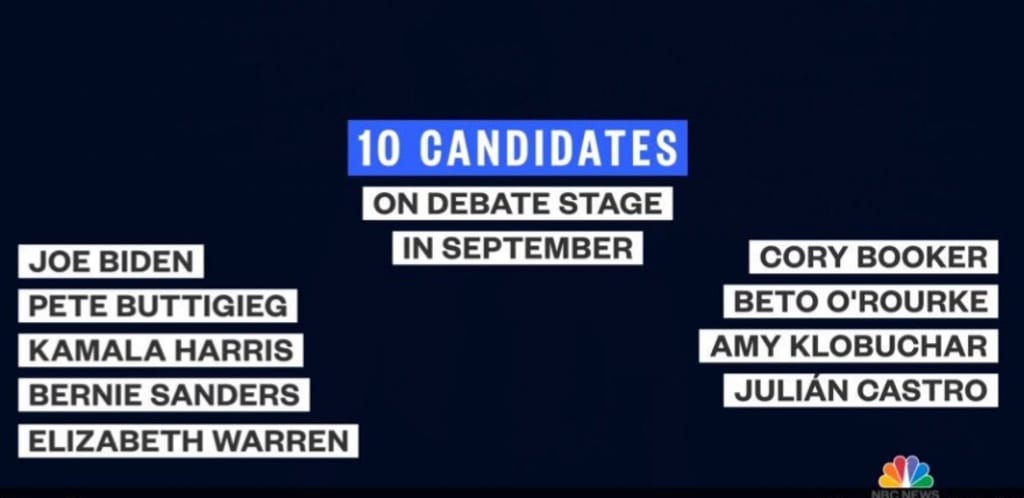
A Visual History of the #YangMediaBlackout A_Visual_History_of_the_YangMediaBlackout November. 20, 2019 byScott Santens An ongoing historical record of mainstream media exclusions of Andrew Yang (Last Updated: 11/19/2019) Back in June of 2019, I tweeted about the latest egregious example of MSNBC excluding Democratic Presidential candidate Andrew Yang from their ongoing coverage of the 2020 Presidential candidates. There had been previous examples, but that was the worst up to that point because they had photos of all 20 candidates who were going to be in the first debates, and instead of including Yang as one of them, they included someone who wasn't even going to be there. I then started to add each new example as a new reply, and that ongoing thread has now been covered over and over again with each new example as a source of entertaining absurdity. It's been covered by traditional media outlets like The Guardian, Vox, and The Hill. It's also been covered by new media like Ethan and Hila Klein of the H3 Podcast for their two million subscribers. I have gotten many requests to put the entire thread in one place outside of Twitter, so this article has been created to meet that request. Each time a new example occurs, I will update the thread on Twitter, and update this page on Vocal too. I have also made a point here of expanding on the thread in a way I can't on Twitter, by expanding the timeline with earlier examples that had occurred before I started my thread. So instead of starting in June, this timeline starts back in March... March 18, 2019: Andrew Yang excluded from list of all announced Democratic candidates. Source: /r/YangForPresidentHQ March 19, 2019: Andrew Yang excluded again from list of all Democratic candidates. Source: /r/YangForPresidentHQ April 17, 2019: Andrew Yang excluded again from list of all Democratic candidates. Source: Morning Joe April 25, 2019: Andrew Yang excluded again from list that has grown to include Joe Biden. April 28, 2019: During an interview with Andrew Yang, to his face, he's shown this list of all candidates, which again excludes him, even though they're talking to him. Source: Weekends with Alex Witt May 17, 2019: With the list of candidates now exceeding twenty, Andrew Yang is excluded yet again, despite outpolling seven of the candidates listed. June 9, 2019: Andrew Yang excluded again from list of candidates running, despite outpolling half of them. June 22, 2019: Listing all twenty candidates who will be in the first debate over two nights, Andrew Yang is excluded to make room for a candidate who didn't even qualify for the debate. This marks the beginning of my thread on Twitter. June 25, 2019: On Morning Joe, every candidate's name in the top eight is read aloud, except for Andrew Yang's. Be sure to watch the video. June 26, 2019: In their coverage of a MoveOn poll, MSNBC excludes Andrew Yang, despite their obviously being room for him, and it looking odd to do so. June 27, 2019: Despite outpolling half the stage, Andrew Yang is asked the fewest questions at the first debate hosted by NBC. June 28, 2019: In one of the more amusing examples, MSNBC's graphic is turned off right when Andrew Yang's name is mentioned. June 29, 2019: In another odd-looking example, Andrew Yang is excluded despite it looking weird to do so with four names on the left and three on the right. June 30, 2019: Yet again, Andrew Yang is excluded in a way that makes the graphic look like something is weirdly missing. July 4, 2019: In this example, Andrew Yang is either missing entirely or is located in the lower left-hand corner behind the chyron. July 11, 2019: Given the opportunity to describe Andrew Yang's platform, MSNBC chooses to exclude all three of his main policies: The Freedom Dividend, Medicare for All, and Human-Centered Capitalism, and instead lists six of his lesser-known policies. August 4, 2019: Having invited Andrew Yang to speak about the mass shootings in Ohio and Texas, MSNBC cuts away while speaking to Yang to cover Bernie Sanders. August 9, 2019: In their coverage of the poll that qualified Andrew Yang for the fall debates, MSNBC excludes Yang. August 14, 2019: In this example, MSNBC includes Andrew Yang, but makes sure to put him in the very back and block him from the shot. August 15, 2019: Given a poll where three candidates polled at 2%, two of them are included while Andrew Yang is not. August 27, 2019: Given a poll where Andrew Yang polled 7th highest, CNN chooses to exclude him and leave four spaces empty. August 28, 2019: In their coverage of a Quinnipiac poll where Andrew Yang ranked 6th highest, CNN decides to exclude Yang and instead include Beto O'Rourke who didn't even make the top six. In a correction, they later remove Beto, but continue to exclude Yang. September 2, 2019: In a graphic that is obviously ordered from highest to lowest ranking in the polls, Andrew Yang is moved from 6th to 9th, while Klobuchar is moved from 10th to what should have been Yang's position. September 5, 2019: Listing the 10 candidates who will appear in the September debate, MSNBC lists only nine candidates. Andrew Yang is missing. September 6, 2019: On NBC's website full of candidates, for some reason Andrew Yang had no listed profile. This omission was later corrected. September 9, 2019: In one of the more infamous examples, Andrew Yang was listed as John Yang while crowdsurfing, causing #WhoIsJohnYang to trend on Twitter. September 12, 2019: Analysis of ABC coverage reveals Andrew Yang had been provided with two seconds of coverage despite outpolling others given orders of magnitude more time. September 21, 2019: Reporting on the Iowa Steak Fry, MSNBC created a graphic that excluded not only Andrew Yang, but also Bernie Sanders and five other candidates who attended the event. Snopes reached out to MSNBC to comment on this one. They did not respond. October 3, 2019: After hauling in $10 million in the third quarter, CNN chose to exclude Andrew Yang and instead include Cory Booker who raised $4 million less. October 5, 2019: In a graphic with one error, its Andrew Yang where the mistake was made. October 13, 2019: Reporting on the results of a Fox News poll, CNN chose to include Cory Booker, but not Andrew Yang, despite both getting 2% in the poll. October 19, 2019: In their reporting of the candidates with the most cash in hand, MSNBC chose to exclude Andrew Yang, and instead include Cory Booker who had less cash on hand. October 22, 2019: Deciding to do a special on climate change where the top seven Democratic candidates are asked about their climate change policies, the Weather Channel chose to exclude Andrew Yang, despite being ranked 6th. October 24, 2019: Reporting on a new poll where six candidates polled at 1%, CNN decided to include only Beto, while excluding Andrew Yang and four other candidates. October 31, 2019: When Andrew Yang achieved his first qualifying poll for the December debate, MSNBC chose to exclude him from the poll results, despite showing Tulsi Gabbard. They both got 5% in New Hampshire. October 31, 2019: When 300 schools in Iowa held a mock election, Andrew Yang got the 4th highest number of votes. Local ABC affiliates chose to display Pete Buttigieg in 4th. They later corrected their story and said all the votes hadn't come in yet at the time of reporting, but nowhere in the original story did they say the results weren't final, and despite Biden, Yang, and Pete all being virtually tied at 7%, they chose to show only Biden and Pete. November 10, 2019: In a report on how cable news is disproportionately covering the Presidential candidates, MSNBC chose to exclude Andrew Yang from a graphic which listed 10 candidates, including Beto O'Rourke who had already dropped out of the race. For the record, only five candidates were outpolling Yang during the week listed, and he got 0.5% of the coverage. November 17, 2019: In one of the most egregious examples so far, MSNBC reported on the results of a Des Moines Register poll by including every candidate who polled over 0%, except Andrew Yang who polled at 3%. Notable in this exclusion is their inclusion of Michael Bloomberg who has yet to officially announce that he's even running, and the fact there's an empty spot. I will continue updating this story with new examples for as long as there are new examples to list. Place your bets on what the next example will be and when it will occur... Source: https://vocal.media/theSwamp/a-visual-history-of-the-yang-media-blackout
By Joseph A. Wulfsohn | Fox News Andrew Yang's presidential campaign offered an icy response to MSNBC after the network apologized for snubbing the candidate from a polling graphic over the weekend. Watch the latest video at foxnews.com Yang's White House bid has exceeded many expectations on the campaign trail. In the latest Iowa poll from CNN and the Des Moines Register, the entrepreneur reached 3 percent support, tying him with Sens. Kamala Harris, D-Calif., and Cory Booker, D-N.J., along with Rep. Tulsi Gabbard, D-Hawaii, and billionaire donor Tom Steyer. However, in an on-air graphic of that poll, Yang was missing from the roster -- even though it included former New York City Mayor Michael Bloomberg, who polled at 2 percent, and Sen. Michael Bennet, D-Colo., at 1 percent. "Why does @MSNBC keep leaving out @AndrewYang on their graphics (actually at 3% here)?" political commentator Ian Bremmer asked. "This has happened on a number of occasions, I haven’t seen with any other candidate. It’s not just a slip-up. Unacceptable." Why does @MSNBC keep leaving out @AndrewYang on their graphics (actually at 3% here)? This has happened on a number of occasions, I haven’t seen with any other candidate. It’s not just a slip up. Unacceptable. pic.twitter.com/2vJrYx5DKQ — ian bremmer (@ianbremmer) November 17, 2019 The graphic sparked a major outcry from Yang's supporters and #YangMediaBlackout was trending on Twitter. MSNBC offered an apology to Yang on Sunday, claiming it "inadvertently" left him off the graphic and shared a graphic that included him as well as the several candidates who had polled at zero percent. The Yang campaign didn't seem to welcome the apology. "Thank you @MSNBC, for making this apology for the 15th time. The #YangGang is very excited for #16," Yang campaign manager Zach Graumann reacted. Thank you @MSNBC for making this apology for the 15th time. The #YangGang is very excited for #16. https://t.co/l17c49Z8TP — Zach Graumann🧢 (@Zach_Graumann) November 18, 2019 As Bremmer referenced, this wasn't the first time MSNBC snubbed Yang from an on-air graphic. In fact, writer and vocal Yang supporter Scott Santens previously documented every instance in which MSNBC or CNN left the tech businessman off a graphic. Between MSNBC, NBC News and NBC digital platforms, Santens' thread included 15 other instances depicting Yang's absence dating back to June. CNN had at least five instances as well.
The advancement of technology in America has driven the advancement of humanity nationally and globally. But technology has also outpaced our government’s understanding of it, and regulations are falling short of protecting us from Big Tech companies that are prioritizing profits over our well-being. Today, we live in a hyper-connected environment, led by these tech companies, that has impacted our culture, lifestyles, families, and politics. The culture of innovation and the quality of human capital in America has fostered the growth of this industry over the past couple of decades to create trillion-dollar tech companies, in a framework of self-regulation. But the benefits these services have given us have begun to clash with the wellbeing of society. Big Tech companies are the winners of the 21st century economy. They’ve amassed too much power, largely profiting from our personal data, and unaccountable responsibility—we have reached a point where the government needs to step in. And we’re starting to take notice, with about 50% of US adults1 favoring more regulation on tech firms. These companies themselves are asking for regulation (until you propose specifics). Unfortunately, our government is unequipped to handle it. We dissolved the Office of Technology Assessment in 19952. Recent hearings3 with tech CEOs like Mark Zuckerberg exposed the lack of basic understanding of technology by members of our Congress. Digital giants such as Facebook, Amazon, Google, and Apple have scale and power that renders them more quasi-sovereign states than conventional companies. They’re making decisions on rights that government usually makes, like speech and safety. Their business models are predicated on keeping people engaged, driven by algorithms that are supercharged by technology to predict our behavior, such as artificial intelligence and machine learning, and that feed off of our data, creating an increasing asymmetry of power without any accountability. The most concerning of all is the effect technology and social media platforms are having on our kids. Technology, smartphones, and tablets are ubiquitous. Our kids have access to them from infancy. They’re getting hooked, from a young age, on apps and platforms that function as dopamine slot machines, potentially destroying the psyches of a generation. It’s affecting our kids’ mental and physical health, contributing to obesity, sleep deprivation, posture issues, stunting social skills, and blurring the lines between real and virtual relationships. It’s time to take action. We need to come up with 21st century solutions to these problems. My approach is four pronged: 1. Regulate the use of data and privacy by establishing data as a property right. The associated rights will enable individuals to retain ownership and share in the economic value generated by their data. 2. Minimize health impacts of modern tech on our people, particularly our children. I will create a Department of the Attention Economy that focuses on smartphones, social media, gaming, and apps, and how to responsibly design and use them, including age restrictions and guidelines. 3. Stop the spread of misinformation that is eroding trust in our institutions and fanning the flames of polarization in our society. I will scale up VAT on digital ads to hasten a shift away from ad-driven business models, require disclosures on all ads, regulate bot activity, and regulate algorithms, addressing the grey area between publishers and platforms. 4. Adopt a 21st century approach to regulation that increases the knowledge and capacity of government while using new metrics to determine competitiveness and quickly identifies emerging tech in need of regulation. Applying 20th century solutions to 21st century problems is not the right way to go. Measures such as breaking up big tech companies to foster competition wouldn’t necessarily address the fundamental problems. Breaking up Google into 5 mini-Googles wouldn’t change much as people don’t want to use the fourth best search engine. Network effects would eventually turn out a dominant player. That’s why we are taking a modern approach. This is a New Way Forward. 1. Data as a Property Right, and Increased Privacy Protections Each of us generates a significant amount of data each day4 during the normal course of our activities, and our data is now worth more than oil.5 Our phones and computers track our movement and actions, while our browsers and websites track our online activities. As we’ve seen, some of the largest tech companies can know more about us and our lives than our families and those closest to us. That’s what happens when about 90%6 of all online searches globally are done on just one platform. As of now, that data is owned by the people who collect it, and they’re allowed to do anything they want with it. They’ve sold it, used it to target us with advertisements, and have analyzed the vast quantity of data to draw conclusions on whole populations, allowing them to monetize it. At this rate, the extraction of personal data is America’s fastest growing industry, worth $197.7 billion by 2022.7 We’ve also seen it abused. Some companies haven’t done enough to protect our data, resulting in breaches that have made our private information insecure. Others have sold it to disreputable companies, allowing them to target us for everything from marketing fraudulent services to influencing elections. Companies themselves have asked for better and clearer rules. This breach in American privacy and data security requires regulation of ongoing data collection. If our data is being used, we need to know how it’s being used and how we’re being compensated for it. We also need to regain control of it when we want. By implementing measures to increase transparency in the data collection and monetization process, individuals can begin to reclaim ownership of what’s theirs. Data generated by each individual needs to be owned by them, with certain rights conveyed that will allow them to know how it’s used and protect it. These rights include: The right to be informed as to what data will be collected, and how it will be used The right to opt out of data collection or sharing The right to be told if a website has data on you, and what that data is The right to be forgotten; to have all data related to you deleted upon request The right to be informed if ownership of your data changes hands The right to be informed of any data breaches that include your information in a timely manner The right to download all data in a standardized format to port to another platform Consent should be informed and active – companies are responsible for ensuring that they collect a positive opt-in from each user before collecting any data, and this opt-in should be accompanied by a clear and easy-to-understand statement about what data is being collected, and how it is going to be used. You can waive these rights and opt in to sharing your data if you wish for the companies’ benefit and your own convenience – but then you should receive a share of the economic value generated from your data. As President I Will… Use a VAT on digital advertisements and data use to ensure every person whose data is used for tech companies to sell ads and sustain their business model will get a slice of every digital ad. Establish a Digital Bill of Rights that clearly outlines how data is allowed to be collected and used. Allow individuals to port their personal data to and from platforms of their choosing. Mandate that platforms offer users the option to delete customer data after using it. Mandate that all platforms have the option to use their service without collecting data or personal information on the user. 2. Minimize health impacts of modern tech on our people, especially our children We are beginning to understand exactly how much of an adverse effect some of these new technologies are having on the well-being of society, especially on our children. There are serious concerns about their effects on our kids’ brains, socio-emotional states, and cognitive and physical development at a time when 22% of young children, 60% of tweens, and 84% of teenagers currently use a smartphone and social media apps.8 Without real accountability, platforms like Facebook, Twitter, and Instagram are ignoring the negative impact of their services on our children. As the father of two young boys, I worry about what this will mean for the generations growing up with these technologies. Our kids have access from infancy. They’re getting glued on apps and devices that are functioning as dopamine slot machines. I look back at my childhood and I remember riding a bike around the neighborhood, but now tablets, computers, and mobile devices have shifted the attention of youth. Today, more than half of children aged 8-12 have their own tablet and a quarter of them have their own smartphone.9 The effects are worrying. There has been an unprecedented surge in depression,10 anxiety, and suicide, and a marked decrease in sociability. Teenagers are spending more time worrying about whether their online acquaintances like their recent post than spending time with their friends in person and developing social skills. The average teenager spends Friday nights at home, interacting with a machine, instead of being out with friends. Even the content for children on these platforms isn’t subject to any rules and standards the way they are on TV. This lack of regulation means that our children are exposed to extreme and inappropriate content at younger and younger ages. It’s also causing other risks to health. Studies have found adverse associations between screen time and sleep deprivation.11 Extended screen time has also been linked with obesity in children. The health of our kids, and potentially of generations after, are at risk. We must take action. Those who have worked within the industry describe the work they’ve done in stark terms. They say that the smartest minds of a generation are spending their time getting teenagers to click on ads and obsess over social media posts. In short, many experts are worrying that the widespread adoption of a poorly understood technology has caused mental health and developmental problems for an entire generation. We can’t just accept that our kids aren’t all right—we need to do something about it. As President I will… Create a Department of the Attention Economy that focuses specifically on how to responsibly design and use smartphones, social media, gaming, and chat apps. It will include overall guidelines, as well as age-based ones. Provide guidance (and regulation, if needed) on design features that maximize screen time for young people, like removing autoplay video for children under 16, removing the queues that allow infinite scrolling, capping the number of recommendations per day, reducing notification signs and “like” counts, and using artificial intelligence and machine learning to determine when children are using devices to cap screen hours per day. Establish rules and standards around kid-targeted content to protect them from extreme or inappropriate content. Incentivize content production of high-quality and positive kids programming similar to broadcast TV. Require platforms to provide guidance on kid-healthy content for parents, and provide incentives for companies that work to make user data of minors available to their parents. Include classes on the responsible use of technology in public school curricula and teach children how to distinguish reliable from unreliable news sources online. 3. Stop the spread of disinformation Social media platforms have catalyzed mass disinformation campaigns over the past decade, threatening not just our wellbeing but our democracy. Despite efforts by the tech companies themselves to combat internet disinformation, political disinformation campaigns have reached over 70 countries. Facebook has become the number one social network for disinformation.12 Algorithms driving recommendations towards conspiracy theory content or other types of disinformation need to be reined in. Same goes for bots, which have exacerbated the situation. We must address once and for all the publisher vs. platform grey area that tech companies have lived in for years. Facebook, Twitter, and other social media sites are using algorithms to make recommendations. These recommendations drive the majority of traffic, up to 70% for Google owned YouTube.13 Section 230 of the Communications Decency Act14 absolves platforms from all responsibility for any content published on them. However, given the role of recommendation algorithms—which push negative, polarizing, and false content to maximize engagement—there needs to be some accountability. As President I will… Amend the Communications Decency Act to reflect the reality of the 21st century— that large tech companies are using tools to act as publishers without any of the responsibility. Assist companies in detecting bots and penalize them if they don’t meet minimum effectiveness thresholds at regulating the spread of information, especially from foreign actors. Work with companies to create algorithms that minimize the spread of mis/disinformation, and information that’s specifically designed to polarize or incite individuals. Require algorithms on platforms that allow political advertisements or the sharing of news stories to be open source, or confidentially disclosed to the Department of the Attention Economy. Require large, clear labeling on all advertisements shown on an online platform. Require the publication in a conspicuous location of how purchases and data is being used to target the individual with other advertisements. Place a higher VAT on digital advertisements in order to incentivize companies to shift to an ad-free, subscription model. Include classes on the responsible use of technology in public school curricula and teach children how to distinguish reliable from unreliable news sources online. 4. A modern approach to antitrust and regulation requires a 21st century framework In order to regulate technology effectively, our government needs to understand it. It’s embarrassing to see the ignorance some members of Congress display when talking about technology, and anyone who watched Congress question Mark Zuckerberg is well aware of this. Without a base level of understanding, it’s unreasonable to expect proper regulation of major tech companies, or the drafting of legislation that addresses the critical technological issues that we’ll continue to face in artificial intelligence and cybersecurity. Yet, the Office of Technology Assessment (OTA), which provided valuable research and briefings to inform our legislative branch, was phased out in 1995.15 Free of the bias of private industry or think tanks, the OTA provided neutral information on the latest technological developments to legislators. Many of these reports, despite being a quarter of a century old, show an amazing prescience on topics that are still relevant to this day. This vital institution needs to be revived, with a budget large enough and rules flexible enough to draw top talent away from the very lucrative private sector, and with the mandate to ensure that our legislators are up to the task of regulating the biggest technological issues of our time. Additionally, it’s high time we created a Department of Technology at the Cabinet level. Technological innovation shouldn’t be stopped, but it should be monitored and analyzed to make sure we don’t move past a point of no return. This will require cooperation between government and private industry to ensure that developing technologies can continue to improve our lives while keeping our data safe and ensuring our autonomy. This Department, based in Silicon Valley and initially focused on Artificial Intelligence, will be led by a Secretary of Technology who will spearhead public-private partnerships to tackle emerging threats and maximize the benefit of technological innovation to society. Once the government is up to speed on technology, and measures have been implemented to curb the negative effects on society, we must ensure that control over the most powerful technologies in history don’t accrue in the hands of a few. However, we must recognize that 20th century frameworks of breaking up companies just based on size or pricing impact on consumers won’t be effective. Network effects will always ensue, as a dominant player invariably emerges. And no one wants to use the fourth best search engine. There are certainly times when parts of a tech company should be divested based on traditional metrics, but other metrics beyond size and consumer impact—such as data assets, vertical integration, or lack of new business formation—should be considered as well. Determining monopoly power requires us to make clear distinctions on market player vs. market platform. If Amazon is the marketplace, it shouldn’t be competing as a market player, as well. It’s difficult for Amazon or Apple to guarantee credibility to other market actors that they won’t take advantage of their access to information and their ability to shape the market conditions. Consolidation of data assets, shutting down competition (even if it won’t affect prices), and the lack of competitive business formation should all be considered when determining whether the government needs to take action against a business. Finally, government needs to be forward-thinking and informed on the latest technological developments, so that new regulations can keep up with innovation. We shouldn’t stifle innovation, but we also shouldn’t let it outpace our ability to regulate it. Two recent examples that highlight the problems: cryptocurrencies, and video game loot boxes. Both are areas that many legislators are blind to, or completely unprepared to understand the technical aspects of. This is creating an unregulated marketplace in both areas. The lack of regulation is having disparate impacts: Cryptocurrencies are seeing levels of fraud because of the lack of regulation. Other countries, which are ahead of us on regulation, are leading in this new marketplace and dictating the rules that we’ll need to follow once we catch up. Loot boxes are impacting our children, causing them to spend more time and money on these video games, without many parents being aware of their existence. Cryptocurrencies and digital assets have quickly grown to represent a large amount of value and economic activity, outstripping government’s response. A national framework for regulating these assets has failed to emerge, with several federal agencies claiming conflicting jurisdictions. Currently, different departments of the federal government consider digital assets as property, commodities, or securities. Some states have onerous regulations in the space, such as New York’s BitLicense. Navigating this has had a chilling effect on the US digital asset market. Separately, loot boxes are a mechanism in games where digital items can be purchased to add to the experience, but they’re done in a “blind” manner—you don’t know what you’re receiving until after you pay for it. These mechanisms can seem similar to gambling because of the random outcome, keeping players (usually kids) engaged on the platform for longer or costing them hundreds or thousands of dollars in addition to the base cost of the game. Some games have a “free-to-play” model, where the game itself is free but they’re funded by the purchase of these loot boxes. Regulation that requires online game publishers to increase transparency of draw probability for virtual items, and limitations on number of loot box purchases, would be a start. We also need increased parental control for these items so that children don’t end up responsible for large charges. In short, our government’s knowledge of technology and ability to regulate it and the market is being outpaced by innovation. We need a new generation of leadership that understands these new and emerging technologies so that proper frameworks can be developed to protect consumers and ensure innovation and competition. As President I will… Revive the Office of Technology Assessment and establish a Department of Technology. Set new standards and metrics for antitrust, including size of data assets and lack of business formation. Require platforms that are market players and market platforms to maintain an even playing field for competitor products or services on their platforms, or exit the market. Promote legislation that provides clarity on cryptocurrency/digital asset market space by: Defining what a token is, and when it is a security Defining which federal agencies have regulatory power over crypto/digital assets space Provide for consumer protections Clarify the tax implications of owning, selling, and trading digital assets Promote the nationwide adoption of recognition of protections afforded by a series LLC Preempt state regulations, when possible, to create one national framework Regulate mechanisms in video games that allow people to “gamble” on random items that are purchased with real money to prevent over-purchasing by minors and to increase transparency in what is being received and the value of it. Ensure that “free-to-play” games marketed to minors do not rely on exploiting child psychology for profit, and guarantee that every in-game purchase is approved by an adult. It’s right to embrace technology and all the conveniences and advantages that come with its advancement, but we can’t do it at the cost of our humanity. At the core of our technology use, needs to be our well-being and that of future generations. We owe it to ourselves to pursue a new way forward in this technology-driven era, while we still can. -Andrew Footnotes: 1 – https://news.gallup.com/poll/265799/americans-split-regulation-big-tech.aspx 2 – https://ota.fas.org/otareports/year/1995a/ 3 – https://www.nytimes.com/2018/04/12/technology/mark-zuckerberg-testimony.html 4 – https://www.weforum.org/agenda/2019/04/how-much-data-is-generated-each-day-cf4bddf29f/ 5 – https://www.economist.com/leaders/2017/05/06/the-worlds-most-valuable-resource-is-no-longer-oil-but-da ta 6 – https://www.statista.com/statistics/216573/worldwide-market-share-of-search-engines/ 7 – https://assets.futuremajority.org/uploads/report-for-future-majority-on-the-value-of-people-s-personal-data-shapiro-aneja-march-8-2019.pdf 8 – https://www.commonsensemedia.org/sites/default/files/uploads/research/census_researchreport.pdf 9 – https://www.apa.org/helpcenter/digital-guidelines 10 – https://www.npr.org/2017/12/17/571443683/the-call-in-teens-and-depression 11 – http://www.oecd.org/officialdocuments/publicdisplaydocumentpdf/?cote=EDU/WKP%282019%293&docLa nguage=En 12 – https://comprop.oii.ox.ac.uk/wp-content/uploads/sites/93/2019/09/CyberTroop-Report19.pdf 13 – https://www.pewresearch.org/internet/2018/11/07/many-turn-to-youtube-for-childrens-content-news-how-t o-lessons/ 14 – https://www.eff.org/issues/cda230 15 – https://ota.fas.org/
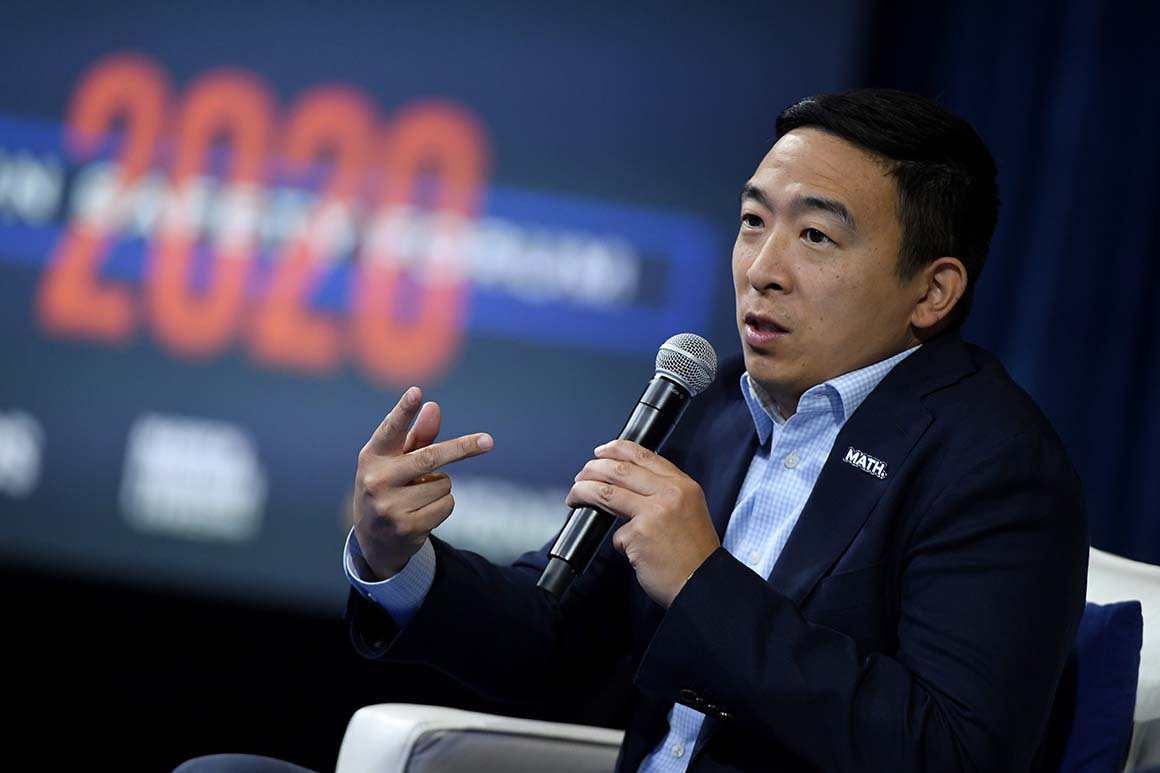
He is the eighth candidate to qualify for the debate, which will be held on Nov. 20. Democratic presidential candidate Andrew Yang. | Ethan Miller/Getty Images By ZACH MONTELLARO | POLITICO Andrew Yang has qualified for the fifth presidential primary debate, making him the eighth candidate to do so. Yang received 3 percent support in a national poll conducted by Quinnipiac University and released on Tuesday. He has previously gotten at least 3 percent in three other polls approved by the Democratic National Committee, according to POLITICO's tracking, and has publicly said he crossed the fundraising threshold of 165,000 unique donors. The debate will be on Nov. 20, hosted by MSNBC and The Washington Post. In late September, the DNC announced the thresholds to qualify for the November debate, the fifth of a dozen planned debates. These thresholds represented a modest increase over the requirements to get on stage for next week’s debate, and aren’t expected to drastically reduce the number of candidates on stage. He joins Joe Biden, Cory Booker, Pete Buttigieg, Kamala Harris, Bernie Sanders, Tom Steyer and Elizabeth Warren as the candidates who have already qualified for the November debate — accounting for eight of the 12 candidates who will participate in the fourth debate next week in Westerville, Ohio. The qualification deadline will be one week prior to the debate, on Nov. 13. It will be in the Atlanta area. Further details like the exact location and format will be announced in the future. Currently, more than a dozen candidates are still short of the qualification thresholds, including four who will be on stage next week in Ohio: Julián Castro, Tulsi Gabbard, Amy Klobuchar and Beto O’Rourke. Those four have all said they've cleared the 165,000 donor threshold required for the debate, but each needs at least three more 3-percent polls to qualify. In the Quinnipiac poll, Warren and Biden are the two clear top-tier candidates. Warren has 29 percent to Biden's 26 percent. Sanders is the only other candidate in double-digits, coming in third at 16 percent. The Quinnipiac University poll was conducted from Oct. 4-7 and surveyed 646 Democratic and Democratic-leaning independent voters. The margin of error is plus-or-minus 4.7 percentage points.
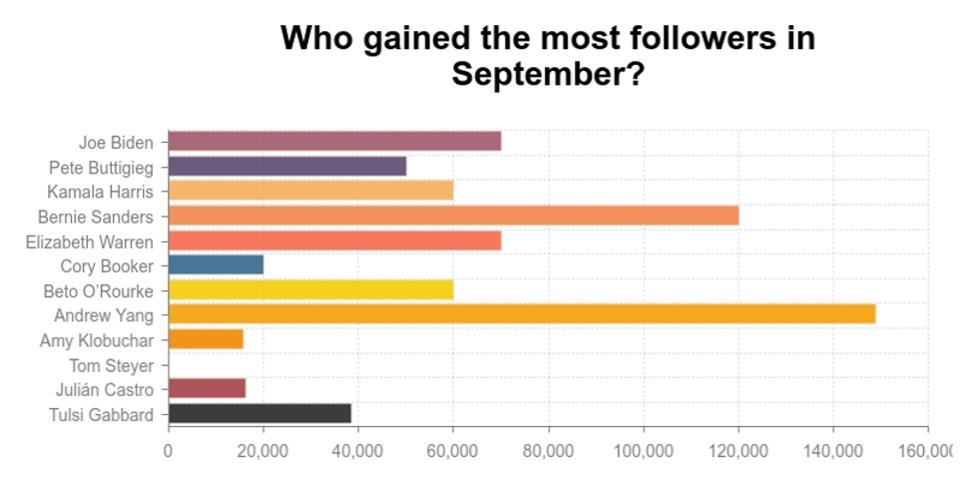
Source: Forbes Note: engagement is defined by the average number of retweets and likes a candidate receives from their tweets. Higher numbers mean a more engaged base of support. Source: Forbes Note: ±4.0 margin of error; Chart: Axios Visuals. Source: AXIOS
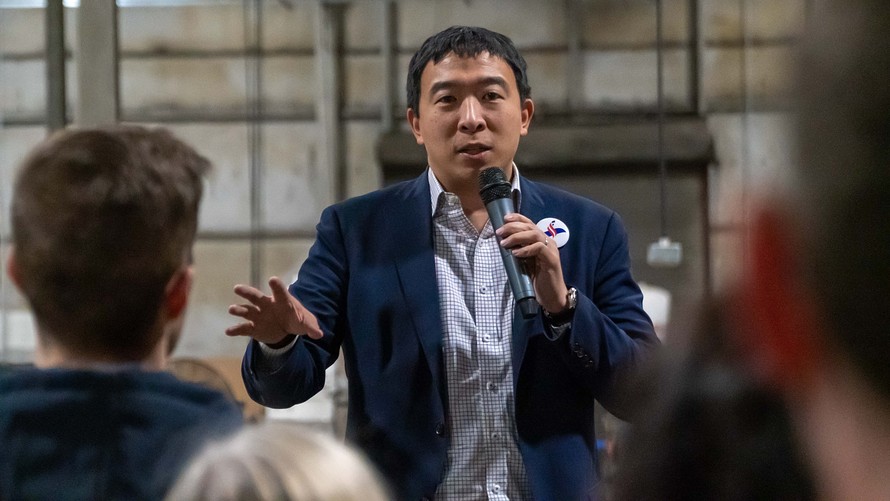
Does a person need money to understand money? BY ALESSANDRAMALITO | MARKET WATCH President Andrew Yang Financial illiteracy is a huge problem in the U.S., and one Democratic presidential candidate says a big barrier to improving it is that a lot of people don’t have much money. Andrew Yang, an entrepreneur running for president in 2020, tweeted on Monday, “In my experience, trying to teach someone financial literacy is very difficult if they don’t have money.” Yang is also the founder of nonprofit Venture for America, which focuses on job creation in cities hit hard by the financial crisis. In my experience, trying to teach someone financial literacy is very difficult if they don’t have money. — Andrew Yang (@AndrewYang) September 24, 2019 The tweet sparked quite a bit of backlash. People responded calling the tweet “inane,” and that those without much money are the ones who need financial literacy — so that they can change their lives with the lessons they’ve learned. Others also mentioned his proposal for “universal basic income,” which would give every American adult 18 and older $1,000 a month, paid for by a new corporate tax. “You’re exactly right, which begs the question, would most people use the extra $1,000 responsibly?” someone else tweeted. Yang’s campaign did not respond to a request for comment. Americans are sorely lacking in financial literacy, especially among young people since the Great Recession. There was an 8% drop in the number of people who could answer questions correctly about interest rates, inflation, bond prices and mortgage rates between 2009 and 2018, from 42% to 34%, according to a three-year study from FINRA’s Investor Education Foundation. Americans also tended to have better self-perceptions of their financial literacy, the study found. Retirement savings is no safer. Many Americans are unprepared for retirement, in part because they did not save enough — or couldn’t afford to do so. But whether a person needs money to understand it is up for debate. Some say yes, that how much money someone has does impact how well they retain lessons about money. “You have to have a sense of driving to get on the highway, you have to warm up when you go to the gym before high-intensity training,” said Dan LaSalle, assistant principal at Olney Charter School in Philadelphia, which has one of the most unique financial literacy programs in the country. Olney pays students who enroll in its financial literacy program up to $5,000 a year to work at the school as a teacher guides them through the importance of budgeting, saving and investing. The school also helps them open up a bank account, something many of their parents don’t have. The median household income in the school’s neighborhood is about $33,000, compared with the national median of $61,000. “So if you want people to be financially savvy and good investors, you have to start early and gradually and they need money to do those things,” LaSalle said. That’s why Yang’s proposal for a universal basic income could help Americans even more — not only would they receive extra cash in their pockets, but they’d have a foundation when they were taught or did read up on financial education. Yang’s campaign also mentions free financial counseling as a policy, though it doesn’t clarify how that would be provided. Still, financial education is valuable whether Americans have big bank account balances or not, said Tim Ranzetta, co-founder of Next Gen Personal Finance, which provides a free personal finance curriculum for high schools. He hears stories from teachers who use this program about the impact these lessons have had on students, and in some cases, their parents, when the students go home and share what they learned. “So many teens don’t have much experience with money yet when personal finance is taught in an engaging way, with hands-on activities and simulations, these lessons stick,” Ranzetta said. Part of the problem may be in how society approaches the definition and deployment of financial literacy, said Joyce Serido, an associate professor and extension specialist of family social science at the University of Minnesota. There are two ways to approach financial literacy, and they’re vastly different. For some, it is understanding and using tools, like 401(k) plans and individual retirement plans (IRAs). For others, it could be how low-income families manage money on a tight budget, and stretch their dollars a long way until the next paycheck comes in. Instead of talking at people who may not have much knowledge of investing and saving strategies, people may need counselors and coaches who can guide them through their own personal situations, she said. “It’s not that financial education isn’t important — it is very important,” Serido said. “When it comes down to it you have to start where the person is and let them dictate the pace at which they can move forward.”
BY MARINA PITOFSKY | THE HILL Entrepreneur and Democratic presidential candidate Andrew Yang endorsed an impeachment inquiry against President Trump on Tuesday following a whistleblower complaint against the president. “Given the President’s latest actions I think impeachment is the right path forward. Asking foreign leaders for political help in return for aid and then suppressing your own agency’s inquiry is egregious,” Yang tweeted Tuesday. “There have to be limits and Congress is right to act,” he continued. Given the President’s latest actions I think impeachment is the right path forward. Asking foreign leaders for political help in return for aid and then suppressing your own agency’s inquiry is egregious. There have to be limits and Congress is right to act. — Andrew Yang (@AndrewYang) September 24, 2019 Yang had previously been opposed to impeachment efforts against the president. Last week, he told USA Today that impeachment would be “impractical.” “Given the current composition of Congress, impeachment would almost certainly not succeed. And then you would wind up inflaming a certain proportion of the president's base with this persecution complex no matter what he does after a failed impeachment process.” Yang said. “It's impractical to champion impeachment just based upon the fact that Republicans still hold so many seats in Congress.” On Tuesday, Speaker Nancy Pelosi (D-Calif.) is expected to announce that the House is opening a formal impeachment inquiry into the president, following reports of a whistleblower report and other allegations that Trump withheld U.S. military aid and pressured Ukrainian President Volodymyr Zelensky to investigate former Vice President Joe Biden and his son, Hunter Biden. However, Trump has denied that there was quid pro quo between the two countries, and he said Tuesday he authorized the release of a transcript of his conversation with the Ukrainian leader.
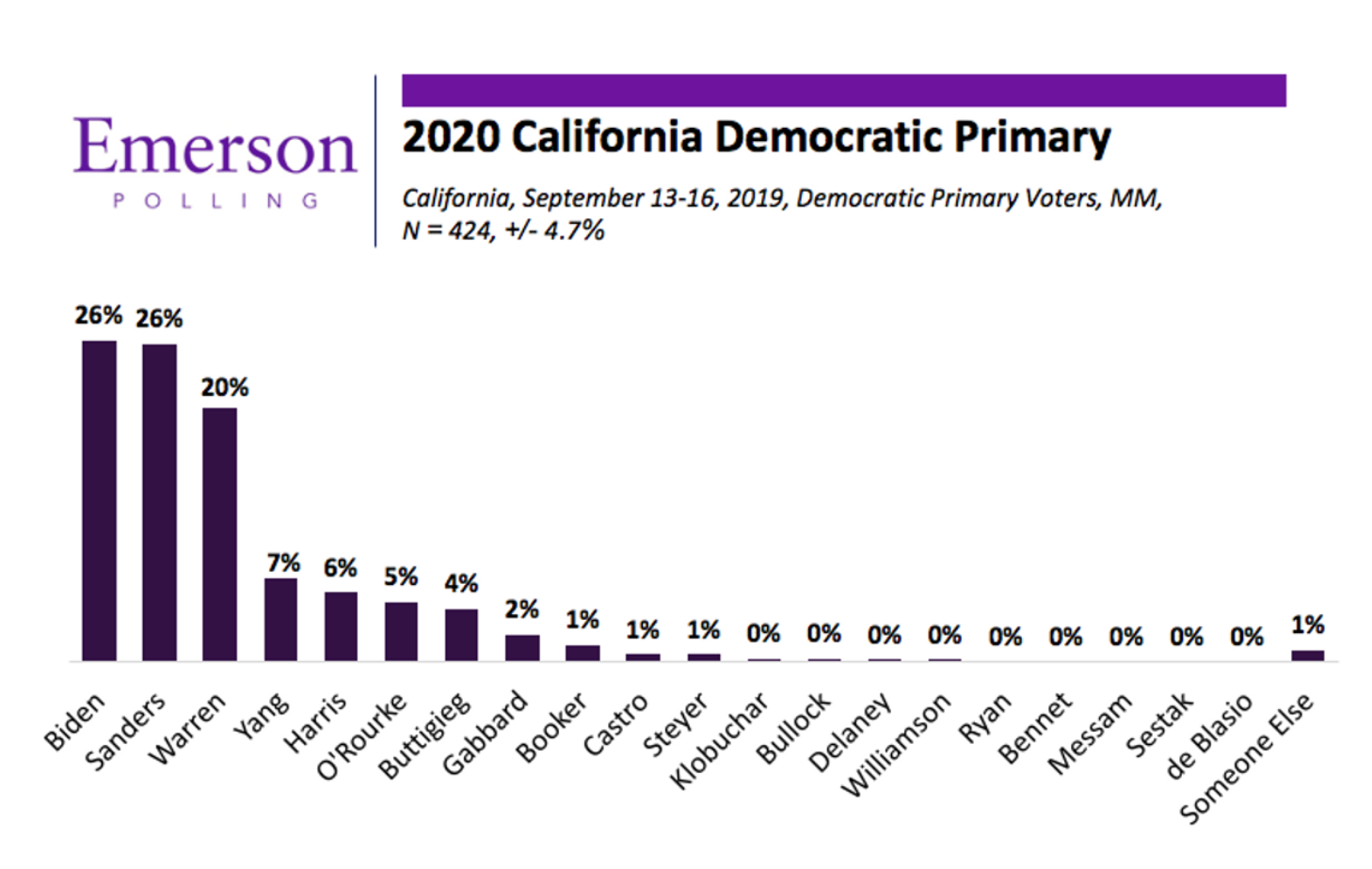
By Chrissy Clark | The Federal List A new Emerson poll shows entrepreneur Andrew Yang polling ahead of Kamala Harris in California, Harris’ home state. Yang is polling at 7 percent, while Harris trails slightly behind at 6 percent. This poll also reveals a stark difference between support for the three top-tier candidates — Joe Biden, Bernie Sanders, and Elizabeth Warren — and the rest of the Democratic candidates. Biden and Sanders are tied at 26 percent, Warren is polling at 20 percent, and the next in line is Yang at 7 percent. That’s a 13-point difference. But other polls show a similar disparity between the top-tier candidates and the rest of the contenders. And the Emerson poll isn’t the only one showing Harris’ plummeting support. A new NBC News/WSJ national poll shows a gap between Biden and Warren from the rest of the Democratic nominees. Warren holds an 11-point lead over Sanders. But Sanders’ double digit numbers still leave him 7 points ahead of the next highest candidate, Pete Buttigieg, at 7 percent. New NBC News/WSJ national Dem poll Biden 31% Warren 25% Sanders 14% Buttigieg 7% Harris 5% Yang 4% Klobuchar 2% Booker 2% — Steve Kornacki (@SteveKornacki) September 17, 2019 The NBC/WSJ poll also shows Harris has lost 8 percentage points since July. What’s caused this steep drop-off for Harris? During the debate on July 31, White House hopeful Tulsi Gabbard ripped into Harris over her harsh prosecutorial record. WATCH: Tulsi Gabbard tears into Kamala Harris' tough-on-crime record as California Attorney General. #DemDebate2 pic.twitter.com/Bw8iFW5wgI — America Rising (@AmericaRising) August 1, 2019 Harris was polling at approximately 15 percent after the first round of Democratic debates, on par with candidates such as Warren and Sanders. After Gabbard attacked her during the second round of Democratic debates, however, Harris’ numbers have demoted her to second-tier candidate status, especially as top-tier candidates begin to gain more traction among Democratic voters at-large.